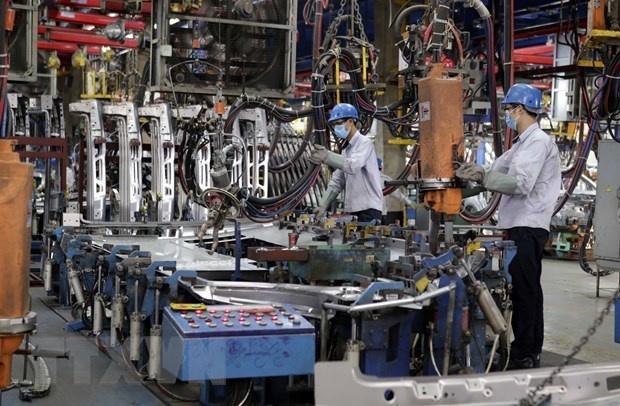Fingers crossed for upwards trajectory in economic growth
 |
| Illustrative image (Photo: VNA) |
Sagarika Chandra, director of Fitch Ratings’ Asia-Pacific Sovereigns team, told VIR that while economic performance in 2021 came in slightly below its expectations, Fitch is maintaining its growth forecast for 2022 of 7.9 per cent. “This is partly driven by base effects and the assumption that economic activity will recover as vaccination rates pick up and the economy gradually adapts to the government’s decision to shift to a safe and flexible adaptation to the pandemic,” Chandra said.
He noted that the improvement in growth in the last quarter of 2021 also suggests economic activity is picking up, which bodes well for the growth outlook in the coming quarters. Nonetheless, growth forecasts remain subject to downside risks from pandemic-related disruptions such as the emergence of Omicron and potentially new variants.
Meanwhile, foreign direct investment (FDI) inflows have remained resilient. FDI inflows are expected to remain strong in 2022, as Vietnam continues to benefit from its entry into trade agreements, trade diversion and cost competitiveness.
On the same note, Khoon Goh, head of Asia Research at ANZ, said, “Vietnam’s economy was hit hard by the pandemic in 2021. While new infections have not fallen and Omicron could lead to a renewed spike in cases, the experience in other countries suggests the new variant is less severe. Therefore, the impact on the economy should be more muted.”
Exports have already rebounded as factories normalise operations, and this is reflected in the price manufacturing index rising to 52.5 in December, the highest since May. “We forecast growth of 8 per cent this year, driven by strong external demand for the country’s exports and a strong recovery in domestic demand as restrictions gradually ease given the high vaccination rate. Vietnam remains an attractive destination for FDI, and we see inflows picking up this year,” Goh claimed.
According to the General Statistics Office, Vietnam’s GDP growth fell to 2.58 per cent growth in 2021 from 2.91 per cent in 2020. The economy grew by 5.22 per cent in the third quarter as a result of the government’s decision to transition from a zero-COVID strategy to a safe and flexible response to the pandemic, resulting in greater economic stability.
The government set the target to achieve GDP growth of 6.5-7 per cent in the positive scenario in 2022. If the country fails to realise its goals, Vietnam’s GDP growth is forecasted to be about 4.5-5 per cent.
A report by securities firm Maybank Kim Eng also pointed out that Vietnam’s GDP growth is expected to recover to 6.7 per cent in 2022 and remain robust at per cent 6.6 per cent in 2023. Coronavirus resurgence due to new variants remains the biggest downside risk, but higher vaccination rates provide grounds for optimism.
Meanwhile, despite supply chain disruptions in 2021, both foreign bank lending data (+15.5 per cent in the first half of 2021 versus +13.4 per cent in the second half of 2020) and manufacturing FDI (+10.1 per cent in the first 11 months of 2021 versus -45 per cent in 2020) continue to recover in 2021.
Growing participation in free trade agreements will strengthen Vietnam’s role as an emerging manufacturing powerhouse, and reopening and relaxation of border controls will likely allow FDI to strengthen more strongly in 2022.
Furthermore, the government is making efforts to boost the economic recovery, as it mulls over a new relief package worth $15 billion that aims to assist businesses and workers while increasing infrastructure spending.
Chandra from Fitch Ratings noted, “Relief measures introduced by the government are likely to support Vietnam’s economic recovery, while the country still has some fiscal headroom. Vietnam’s public finances have been less affected by the pandemic stress than in many of its peers, and under our baseline forecasts, government debt/GDP will remain well below the ‘BB’ median through 2023.”
“From a ratings perspective, a crystallisation of contingent liabilities on the sovereign’s balance sheet that would lead to a failure to stabilise government debt over the medium term would be negative,” Chandra added.
What the stars mean:
★ Poor ★ ★ Promising ★★★ Good ★★★★ Very good ★★★★★ Exceptional
Related Contents
Latest News
More News
- NAB Innovation Centre underscores Vietnam’s appeal for tech investment (January 30, 2026 | 11:16)
- Vietnam moves towards market-based fuel management with E10 rollout (January 30, 2026 | 11:10)
- Vietnam startup funding enters a period of capital reset (January 30, 2026 | 11:06)
- Vietnam strengthens public debt management with World Bank and IMF (January 30, 2026 | 11:00)
- PM inspects APEC 2027 project progress in An Giang province (January 29, 2026 | 09:00)
- Vietnam among the world’s top 15 trading nations (January 28, 2026 | 17:12)
- Vietnam accelerates preparations for arbitration centre linked to new financial hub (January 28, 2026 | 17:09)
- Vietnam's IPO market on recovery trajectory (January 28, 2026 | 17:04)
- Digital economy takes centre stage in Vietnam’s new growth model (January 28, 2026 | 11:43)
- EU Council president to visit Vietnam amid partnership upgrade (January 28, 2026 | 11:00)

 Tag:
Tag:




















 Mobile Version
Mobile Version